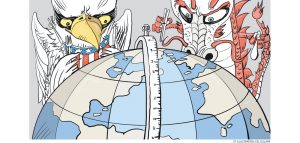China and the US demands weaker countries take sides or face retaliation
The worry is that much as the colonial powers did centuries ago, both China and the US will demand that weaker countries in their path take sides or face retaliation.
A new colonial era is dawning as major powers limber up to wield influence and protect their interests in ways that could significantly impinge on the sovereignty of weaker, smaller states.
This won’t be colonialism in the conventional sense: Subject countries will not immediately be threatened with invasion and occupation, or their sovereignty denied.
But we should be in no doubt of the return of big power machinations across the globe, after a long period of what might be termed benign interdependence. And as competing larger powers vie for strategic space, some sovereignty-impairing collateral damage is inevitable.
Historically, the imposition of colonial rule over India and other parts of Asia was a by-product of commercial competition between clashing European powers, notably England, France, Spain, Portugal and the Netherlands.
Wars were fought in far-off places such as the Indonesian Spice Islands between England and the Netherlands, the two great naval powers of the 16th and 17th centuries, and treaties established that traded occupied territory.
In much the same way, China and the United States, the two great powers of our age, are increasingly asserting influence in the Pacific and in the process, making demands of smaller states in their path.
BELT AND ROAD INITIATIVE V INDO-PACIFIC STRATEGY
This big power competition goes beyond the security sphere. China’s Belt and Road Initiative and the US’ concept of a free and open Indo-Pacific amount to two faces of the same coin; they are both bids to assert political and economic influence, and seek adherence to a certain set of values and norms.
Both China and the US vigorously insist they are upholding principles of openness and equality – just as colonial powers two centuries earlier justified the use of military or diplomatic pressure on underdeveloped countries under the banner of free trade and access to markets.
China’s President Xi Jinping told a high-level forum on the Belt and Road at the end of last month that his global infrastructure initiative was not an “exclusive club”. Similarly, the US insists that the Indo-Pacific strategy is aimed at enhancing shared prosperity and promoting economic and security partnerships to ensure a “peaceful and secure regional order”.
And yet, China views the Indo-Pacific Strategy as a bid to constrain China’s rise as a global economic and security power. The US meanwhile warns that countries targeted for Chinese infrastructure development along the Belt and Road will fall into a debt trap that threatens their economic prosperity.
More troubling, much as the colonial powers did centuries ago, both China and the US are increasingly demanding that weaker countries in their path take sides or face retaliation and recrimination.
The US has mounted a vigorous campaign to persuade countries around the globe to halt the acquisition of telecommunications technology provided by the Chinese tech giant Huawei. It cites concerns about security and intellectual property theft; just as Western powers in earlier eras strived to steal the secrets of Chinese manufacturing of silk, porcelain and tea.
China, for its part, has moved to force countries in the region into cooperative frameworks that exclude Western participation and funding – notably in the Greater Mekong sub-region.
When resistance is encountered, angry threats ensue. The US has the ability to impose sanctions and pursue international jurisdiction based on its own laws. So far, China has confined its threats to angry table thumping and undiplomatic aggressive behaviour, although even rescheduled debt payments that favour borrowers will bind Belt and Road countries to China over the longer term, a recent study concludes.
CLASH OF CIVILISATIONS?
We should all be concerned about threat of armed conflict arising from this competition for power and commercial space. Yet, while it is conventional to consider the events of the past few months the opening shots in a new Cold War, they also presage a more troubling future, one where the world is effectively partitioned and subjugated by major competing powers involving a complex array of commercial and technological issues that were not at play as much during the Cold War.
Beyond the realm of pure competition, the advance of far-right and white supremacist ideas in Europe and the US adds stridency and momentum to the idea of a new form of “mission civilisatrice”.
Commenting recently on rising tensions with China, director of Policy and Planning at the US State Department Kiron Skinner said: “This is a fight with a really different civilisation and a different ideology.”
China has no tradition of European-style colonial expansion, except at certain periods in its immediate domain, but has a long history of demanding recognition of Chinese preeminence in the form of tribute.
Ancient forms of tribute involved exclusive trading arrangements and gifts presented regularly at the imperial court in Beijing. Modern forms of tribute could be seen as evolving in the shape of obligations to China for infrastructure projects built and operated by Chinese companies using Chinese technology. Or, as American expert Jon Alterman put it recently, “a set of wholly interest-based, government-to-government ties that allow the rapid exploitation of economic opportunities on what is, at least initially, a consensual basis”.
The colonial era, defined as a period when European powers as well as the US occupied and governed far-flung territories across Asia, Africa and Latin America, ended in the period immediately after World War II.
By the mid-1960s, most of the larger colonies had won or been granted independence. There followed a brief period of communist expansion, backed by Soviet Russia and China, although these efforts at state capture using the tools of ideological struggle were halted by the end of the 1980s. The ensuing period of globalised interdependence and equality of nations has been short-lived.
SPHERES OF COMMERCIAL AND TECH INFLUENCE
A new colonial era would be marked by the partition of the world into spheres of commercial and technological influence dominated by the US and China.
In this polarised world, physical space and sovereignty might not initially be affected (although the US is considering engineering land swops in the Middle East to settle the Palestinian conflict). But the freedom to choose partners with whom to trade or the technology to communicate will impair sovereign rights.
This in turn would undermine the infrastructure of international governance erected after the end of the last colonial period, and make a mockery of the basic principles underpinning the UN Charter.
To head off the partition of the world into clashing spheres of influence, we need reform of the existing global order to accommodate China and others.
This process requires sincere engagement and dialogue, not confrontation and isolation. The challenge will be that while the US sees the world through the lens of alliances governed by rules and values, China’s view of the world is driven by a much simpler paradigm: Size matters.
Published in The Straits Times, 15 May 2019

